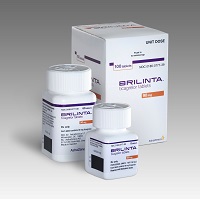 |
Bolstering sales of Brilinta has been a central focus for AstraZeneca ($AZN) CEO Pascal Soriot as of late, and now the British drugmaker is embarking on another project designed to add some shine to the drug.
The company has launched a preclinical development program on a potential Brilinta antidote, now known as MEDI2452. If it works, the antidote could quickly reverse the blood thinner's effects in an emergency, for example, in the event of major bleeding.
"In certain emergencies, doctors need to have the option to swiftly reverse the effects of oral antiplatelet agents … without having to wait for the effects of the medicine to wear off," Brilinta global development lead Marc Ditmarsch said in a statement. "[W]e believe MEDI2452 has the potential to help address this need for patients treated with Brilinta."
 |
| Brilinta global development lead Marc Ditmarsch |
The antidote project comes at a time when AZ is studying Brilinta for long-term use in patients with acute coronary syndrome. It's currently approved for 12 months of treatment after an "ACS event," like a heart attack. An antidote could help Brilinta win safety points for eventual FDA approval for long-term use, or simply help physicians feel more comfortable about using it that way.
Currently, there are no approved products to counteract the effects of clot reducers like Brilinta. If AZ could get one to market, it could give the drug an edge. And considering the generic versions of Sanofi ($SNY) and Bristol-Myers Squibb's ($BMY)Plavix crowding the market, that's something Brilinta could use.
That's not to say Brilinta hasn't shown some promising growth signs for AstraZeneca, which promised shareholders big things back in the spring as it worked to escape Pfizer's ($PFE) clutches. Sales hit $127 million in the third quarter--a 78% increase year over year.
 |
| AstraZeneca CFO Marc Dunoyer |
It helped that AstraZeneca could rev back up on Brilinta marketing in the U.S. In August, the Department of Justice dropped an investigation into the study AZ used to win Brilinta marketing approval. The company had stopped promotional efforts while the investigation continued.
"We steadily continue to take market share in the United States," CFO Marc Dunoyer said on a call with investors, as quoted by Seeking Alpha. "We have always believed in the potential of this product and are pleased with the steady progress it continues to make with ongoing investment."
AstraZeneca isn't the only company developing an antidote to get ahead of its clot-fighting competitors. Boehringer Ingelheim, for one, is working on a product to reverse the effects of next-gen anticoagulant Pradaxa, a thrombin inhibitor. Despite rolling out before rivals Xarelto, from Johnson & Johnson ($JNJ) and Bayer, and Pfizer and BMS' Eliquis, Pradaxa now trails the J&J and Bayer drug in terms of market share. An antidote to Xarelto and Eliquis, both Xa factor inhibitors, is also in the works.
- read AZ's release
- see Reuters' take
Special Reports: Top 10 pharma companies by 2013 revenue - AstraZeneca | Top 10 Drug Launch Disasters - Brilinta